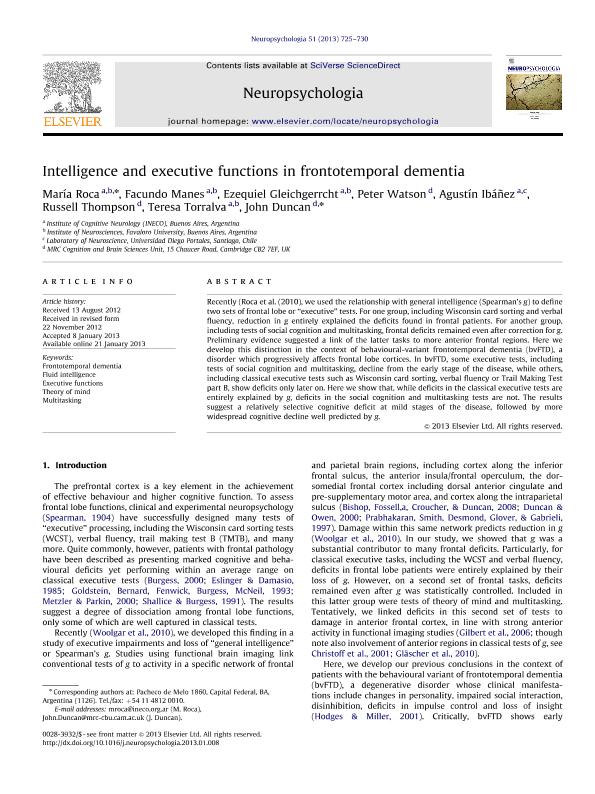Artículo
Intelligence and executive functions in frontotemporal dementia
Roca, María ; Manes, Facundo Francisco
; Manes, Facundo Francisco ; Gleichgerrcht, Ezequiel; Watson, Peter; Ibañez, Agustin Mariano
; Gleichgerrcht, Ezequiel; Watson, Peter; Ibañez, Agustin Mariano ; Thompson, Russell; Torralva, Teresa; Duncan, John
; Thompson, Russell; Torralva, Teresa; Duncan, John
 ; Manes, Facundo Francisco
; Manes, Facundo Francisco ; Gleichgerrcht, Ezequiel; Watson, Peter; Ibañez, Agustin Mariano
; Gleichgerrcht, Ezequiel; Watson, Peter; Ibañez, Agustin Mariano ; Thompson, Russell; Torralva, Teresa; Duncan, John
; Thompson, Russell; Torralva, Teresa; Duncan, John
Fecha de publicación:
03/2013
Editorial:
Elsevier
Revista:
Neuropsychologia
ISSN:
0028-3932
Idioma:
Inglés
Tipo de recurso:
Artículo publicado
Clasificación temática:
Resumen
Recently (Roca et al. (2010), we used the relationship with general intelligence (Spearman’s g) to define two sets of frontal lobe or “executive” tests. For one group, including Wisconsin card sorting and verbal fluency, reduction in g entirely explained the deficits found in frontal patients. For another group, including tests of social cognition and multitasking, frontal deficits remained even after correction for g. Preliminary evidence suggested a link of the latter tasks to more anterior frontal regions. Here we develop this distinction in the context of behavioural-variant frontotemporal dementia (bvFTD), a disorder which progressively affects frontal lobe cortices. In bvFTD, some executive tests, including tests of social cognition and multitasking, decline from the early stage of the disease, while others, including classical executive tests such as Wisconsin card sorting, verbal fluency or Trail Making Test part B, show deficits only later on. Here we show that, while deficits in the classical executive tests are entirely explained by g, deficits in the social cognition and multitasking tests are not. The results suggest a relatively selective cognitive deficit at mild stages of the disease, followed by more widespread cognitive decline well predicted by g.
Archivos asociados
Licencia
Identificadores
Colecciones
Articulos(SEDE CENTRAL)
Articulos de SEDE CENTRAL
Articulos de SEDE CENTRAL
Citación
Roca, María; Manes, Facundo Francisco; Gleichgerrcht, Ezequiel; Watson, Peter; Ibañez, Agustin Mariano; et al.; Intelligence and executive functions in frontotemporal dementia; Elsevier; Neuropsychologia; 51; 4; 3-2013; 725-730
Compartir
Altmétricas



